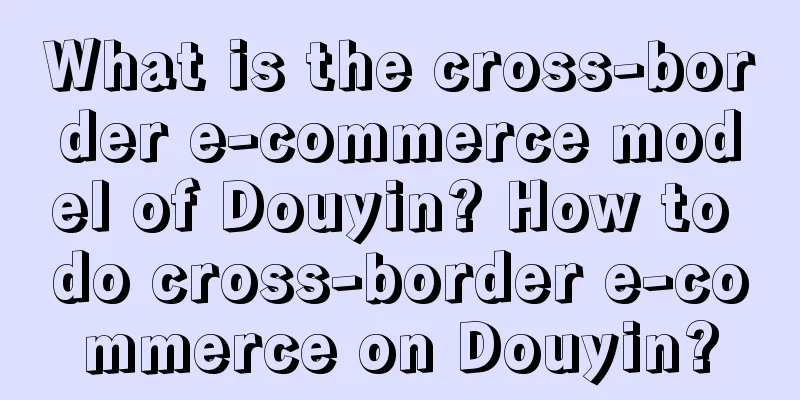I am still not optimistic about WeChat video e-commerce

Since the second half of 2023, the trend of WeChat Video Account concentrating resources on e-commerce has become increasingly obvious. At the beginning of 2024, Zhang Xiaolong himself began to personally assume the responsibility of the "number one" e-commerce of Video Account. We can see more and more clearly that the traffic and operating resources of Video Account are significantly concentrated on e-commerce. My friends in the e-commerce industry are very excited about this. One of them said: "If Zhang Xiaolong hadn't been obsessed with concerts, Video Account would have been doing it long ago. WeChat Video Account will definitely become the largest platform for bringing goods!" I can understand the desire of friends in the e-commerce industry, especially those who work with private domain traffic, to bring goods through video accounts. For many years, various merchants, MCNs, and Taobao customers have been trying to find ways to seamlessly transfer the public domain traffic of e-commerce platforms to the private domain - in other words, to direct the traffic of e-commerce platforms to WeChat. Now that video accounts are on the rise, and video account sales have gradually become mainstream, they will of course be excited. Selling goods on video accounts, building fan disks, and then directing traffic to WeChat groups, corporate WeChat, public accounts, and mini programs is a very smooth and proven path. If the scale of video account e-commerce can reach the level of Douyin today, it means that countless people have another chance to get rich. Over the past four years, I have been very optimistic about WeChat Video Account. I used to think, and still think, that it will become the most successful short video platform in China; but this does not mean that I am optimistic about its expansion in e-commerce business, even if Zhang Xiaolong himself is the leader. There are many reasons. Let me first talk about three old problems that are generally recognized by the market: bringing goods will bring huge pressure on after-sales service, pressure on supply chain and other fulfillment capabilities, and high requirements for event operation capabilities - all of which are beyond Tencent's ability to bear at this stage. Anyone who has worked on an e-commerce platform can easily understand that e-commerce is the hardest hit by after-sales and compliance issues, and live streaming is the hardest hit among the hardest hit. On major short video platforms, the vast majority of customer complaints and compliance issues are caused by live streaming. Especially for those platforms that have established a "closed loop of e-commerce transactions", they need to fully endorse the quality of goods and the qualifications of merchants, and the pressure they face is unimaginable to outsiders. Obviously, users who have used Tencent's customer service will admit that customer service is a weakness of Tencent. The biggest problem is the lack of manpower; the second is that the customer service requirements of physical e-commerce are too complicated, far exceeding those of virtual products such as games. With the Internet industry eager to control costs, Tencent will not expand its customer service, product review and compliance teams very quickly. Even if there are enough manpower, it will take a very long time to meet the after-sales service requirements of mainstream e-commerce platforms. It is conceivable that if the scale of video account sales is expanded tenfold, the resulting after-sales disputes and product compliance risks may increase a hundredfold. As for the ability to fulfill contracts , it has long been the core competitiveness of e-commerce platforms over the past few years, and any platform must have a certain degree of control over infrastructure. In this regard, Alibaba and JD.com have invested the most and paid the most attention; Pinduoduo is also catching up vigorously; the shortcomings of Douyin and Kuaishou lie precisely in the lack of infrastructure, and WeChat Video Account is even more backward than them in this regard. In theory, Tencent can solve the problem of fulfillment capacity by acquiring or building its own supply chain. However, in the current macro environment, rashly starting large-scale supply chain investment is undoubtedly a move that will get twice the result with half the effort. More importantly, since 2013, Tencent has abandoned the path of heavy asset operation of e-commerce business; if it wants to go down this path again now, it will be an important strategic turning point, and such a decision is unlikely to be made at this point in time. In fact, whether a decentralized ecosystem like WeChat needs to build its own logistics and other infrastructure, or whether it should rely on third parties as much as possible and not compete with the platform's own fulfillment capabilities, is still an open question. As for operations, they are not only the Achilles' heel of WeChat, but also the Achilles' heel of most non-game applications of Tencent. Zhang Xiaolong is a successful product manager with a "product-first" mindset. The WeChat business group is almost entirely based on product logic. Strictly speaking, the entire Tencent company is permeated with the "product manager culture", hoping to solve problems as much as possible at the product function and design level, rather than relying on operations. Therefore, the vast majority of Tencent's businesses show a "strong product, weak operation" trend (the game business is the only exception). When it comes to e-commerce and local life businesses that require heavy operations, Tencent often has no choice but to raise the white flag. Anyone who has seen the movie "Moneyball" will remember: the protagonist's data team successfully discovered a group of underestimated players and performed far beyond the expectations of the outside world, but ultimately failed to win the playoffs. The reason is simple: the cost-effective strategy of "four ounces to move a thousand pounds" is only applicable to improving regular season results, not to knockout matches where the winner must be determined. In the knockout rounds, only with absolute resource advantages can victory be ensured. This is why championship teams must sign superstars at a very high premium-superstars may not be worth the price, but superstars can bring you championships. For e-commerce, an efficient operation team and huge operation resources are "superstars", and Video Account's current investment in this area is still far from enough! However, I have no intention of denying the recent progress of video account e-commerce. In the past year or so, I have observed two interesting phenomena: first, the popularity of video account live broadcasts has obviously spread from knowledge verticals to more verticals, especially e-commerce verticals; second, the effect of video account heating packages (flow casting) has been significantly improved, which is especially important for the "quick start-up" of e-commerce MCNs. Since the testing of the video account live broadcast function at the end of 2020, the outside world has never stopped criticizing it: "The so-called video account live broadcast is a group of middle-aged greasy uncles sitting in front of the camera, talking about finance, workplace, technology and other unrealistic topics." I would also like to add that the anchors in the early days of video account live broadcast were not only concentrated in the knowledge vertical category and mainly middle-aged men, but also often KOLs in the graphic era (public accounts), and even "ancient big Vs" who have been famous for many years. On almost all other platforms, the mainstream of live broadcast activities is those talent, life and goods anchors - it should be so, after all, they have a wider audience. The above situation has undergone a subtle change as early as 2023. According to my observations and my own data statistics, the operational resources of video account live broadcasts are obviously spreading to a wider range of categories, and the anchor tasks and reward activities are concentrated in the two vertical categories of e-commerce and games. Various types of anchors with goods have sprung up like mushrooms after rain. The e-commerce experts in my circle of friends generally tried video account e-commerce many times in 2021-2022, but they failed because of insufficient platform traffic; since last year, they have once again burst out with enthusiasm for trying. Considering that the entire e-commerce format currently lacks new breakthroughs, as long as the video account gives a little bit of resources, they will try their luck here anyway. As we all know, for e-commerce anchors to quickly get started, they must not only rely on the quality of their own products and content, but also rely on large-scale traffic. Dongfang Zhenxuan's rise to fame in 2022 is inseparable from the fan base accumulated through more than a year of traffic. Historically, the heating package function of WeChat Video Account was launched very late, and the success rate of delivery was not high (many content would be judged by the system as "unsuitable for heating"). Even if it was successfully delivered, the effect was very poor. Therefore, among all the "hand-in-hand teachings on how to make a video account", there are very few teachings on how to gain fans through heating packages, because there is no need. However, according to my observations, the effect of WeChat heating packages has increased significantly since the first half of 2023. Is this caused by the natural growth of video account traffic, or is it the result of the WeChat team's optimization of the algorithm? It is unknown. The video account heating package function is of course benchmarked against Douyin's Dou+. For the Douyin ecosystem, Dou+ gives MCNs the choice of "large-scale delivery and rapid account creation". In the past five years, many big accounts that became famous overnight on Douyin actually followed the following growth trajectory: register an account, publish a large amount of content, and conduct Dou+ delivery; select the best Dou+ delivery results and increase delivery; continue to produce new content with a similar tone to these content; if one or two content results are very good, further increase delivery and strive to make it a hit content; as for content with poor results, it can be gradually deleted. MCNs with rich experience and resources often set up dozens of accounts at the same time and perform the above operations at the same time. As the effect of the video account heating package improves, a large number of MCNs will inevitably flock to the video account and repeat the routines they have played on Douyin; most of them will try to realize e-commerce to a certain extent. Under the combined effect of the above factors, Video Account e-commerce has achieved a certain degree of improvement. I estimate that its current single-quarter GMV level may be similar to that of Kuaishou, far higher than other content platforms such as Xiaohongshu and Bilibili. However, such a record is definitely not enough for Tencent, because WeChat has a very large traffic base. Only when it reaches or approaches the level of Douyin e-commerce, the e-commerce business will be meaningful. Therefore, the road that has been traveled is considered an "easy road", and the road ahead will become more and more difficult. I think if Video Account e-commerce wants to go further, it still faces two specific difficulties. The first is that there is a lack of people in charge who are very familiar with e-commerce within the WeChat business group. From the technical director, the person in charge of various specific businesses and products to Zhang Xiaolong himself, none of them have successful experience in retail e-commerce business. Zhang Xiaolong is very powerful, but he is not a god, and he also needs to gradually accumulate experience. In Tencent's other business groups, such as PCG and CDG, there are some talents with rich e-commerce experience (although their experience is not necessarily successful), but the barriers between the various business groups within Tencent are very high, and it is difficult for them to contribute any real strength to the Video Account e-commerce business. The second is that WeChat is still unwilling to invest a lot of real resources in e-commerce business, whether it is real money or traffic. If Video Account is willing to invest huge traffic, perhaps MCNs such as Dongfang Zhenxuan and Jiaoge Pengyou have already started regular live broadcasts on Video Account. If WeChat is willing to provide a lot of subsidies on shopping festivals such as 618 and Double 11, perhaps users can quickly develop the habit of shopping on Video Account. In the long run, "the wool comes from the sheep", and the resources invested by the platform must be recovered in various ways; but in the short term, it is not possible not to invest resources, especially when competitors are investing resources fiercely. Some people would say: "Spending a lot of money on activities and supporting influencers is not WeChat's strength. Video accounts should be good at making the best use of little effort." The problem is that when Video accounts have already reached a large scale, "making the best use of little effort" is probably no longer a reasonable choice, especially in e-commerce business. In the future, it will also have to fight a brutal war of attrition like Douyin and Kuaishou. I think it is normal for the GMV of video account e-commerce to reach 2 trillion within a certain period of time, and it may even be achieved in the short term. According to the definition of general platforms, e-commerce business of this magnitude is already very successful, but for WeChat, it can only be considered successful if it reaches the level of JD.com, the third largest traditional e-commerce platform in China, or the level of Douyin, the largest content e-commerce platform. Can WeChat do this? I doubt it. This is why I said in the title "I am not optimistic about WeChat video account e-commerce." But don’t get me wrong, I am still optimistic about the development potential of WeChat Video Account in content categories other than e-commerce, which is why I personally spend a lot of time and energy on Video Account. I believe that many video account creators have similar views to me. Author: Pei Pei, leader of the Phantom Thieves Source: WeChat public account "Internet Phantom Thieves (ID: TMTphantom)" |
<<: How did this large company achieve performance growth through business analytics?
>>: Save money or make money? Young people want everything in their "second-hand life"
Recommend
How often does Amazon update its warehouse capacity? How is Amazon's storage fee calculated?
Amazon has set storage limits for sellers. The pur...
How to apply for a cross-border e-commerce business license? How long does it take?
The most basic requirement for cross-border e-comm...
Selling down jackets by weight has become a hot topic on the Internet. These merchants are "going crazy", but have they made money?
Clothes can also be sold by weight? This article i...
Does it cost money to open a temu store? Do I need a business license?
Some sellers are interested in the cross-border e-...
Which international logistics company is the cheapest? Detailed analysis
Sometimes we do cross-border business or go abroad...
How to create something new through cross-border activities?
As the co-branding mechanism of major brands matur...
After posting 2 videos in a row, which swept the entire Internet, Liziqi is back!
The perfect fusion of cultural heritage and pastor...
15 million followers in 5 days, the story of overseas bloggers "digging for gold"
Life abroad may be what many people dream of. Ther...
The county town has changed, and young people have changed their minds
Coffee shops, script-killing games... my hometown ...
Douyin and Tencent Video reached a cooperation, witnessing the historical moment
Recently, after a long tug-of-war, Douyin and Tenc...
What is the end point of the e-commerce war?
In recent years, the e-commerce industry has matur...
Finding the growth lever has increased my content traffic by more than 100 times
Nowadays, Internet traffic always appears in unexp...
Xiaohongshu has many popular articles but they don’t bring conversions. How to break the deadlock?
Hot topics on Xiaohongshu are often practical, nov...
The title of scholar, the spiritual needs of the elderly under the taste segmentation
This article starts with a recent Weibo hot search...
Lei Jun tells stories, but the automotive industry can’t learn from him
Lei Jun's storytelling played an important rol...









